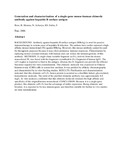| dc.contributor.author | Bose, B | |
| dc.contributor.author | Khanna, N | |
| dc.contributor.author | Acharya, KS | |
| dc.contributor.author | Sinha, S | |
| dc.date.accessioned | 2013-07-03T11:25:00Z | |
| dc.date.available | 2013-07-03T11:25:00Z | |
| dc.date.issued | 2006 | |
| dc.identifier.citation | KIRTDA, DRACHARYAS. 2006. Bose B, Khanna N, Acharya SK, Sinha S.Generation and characterization of a single-gene mouse-human chimeric antibody against hepatitis B surface antigen.J Gastroenterol Hepatol. 2006 Sep;21(9):1439-47 | en |
| dc.identifier.uri | http://profiles.uonbi.ac.ke/sacharya/publications/bose-b-khanna-n-acharya-sk-sinha-sgeneration-and-characterization-single-gene- | |
| dc.identifier.uri | http://erepository.uonbi.ac.ke:8080/xmlui/handle/123456789/44620 | |
| dc.description.abstract | BACKGROUND: Antibody against hepatitis B surface antigen (HBsAg) is used for passive immunotherapy in certain cases of hepatitis B infection. The authors have earlier reported a high-affinity mouse monoclonal (5S) against HBsAg. However, this mouse antibody cannot be used for therapeutic purposes because it may elicit antimouse immune responses. Chimerization by replacing mouse constant domains with human ones can reduce the immunogenicity of this antibody. METHODS: A single-chain variable fragment (scFv), derived from the mouse monoclonal 5S, was fused with the fragment crystallisable (Fc) fragment of human IgG1. The scFv region is expected to bind to the antigen, whereas the Fc fragment can provide the effector functions required for virus neutralization. This chimeric molecule was expressed in Chinese hamster ovary (CHO) cells in serum-free medium. It was purified by affinity chromatography and characterized by in vitro binding studies. RESULTS: Purification and characterization indicated that this chimeric scFv-Fc fusion protein is secreted as a disulfide-linked, glycosylated, homodimeric molecule. The yield of the purified chimeric antibody was approximately 4.6 mg/L. In vitro analyses confirmed that this chimeric molecule retained the high affinity and specificity of the original mouse monoclonal. CONCLUSION: Because it is a single-gene product, this chimeric scFv-Fc has the advantage of stable expression. Being chimeric and bivalent, it is expected to be less immunogenic and therefore suitable for further in vivo studies on virus neutralization. | en |
| dc.language.iso | en | en |
| dc.title | Generation and characterization of a single-gene mouse-human chimeric antibody against hepatitis B surface antigen | en |
| dc.type | Article | en |
| local.publisher | Department of Medicine, College of Health Sciences, University of Nairobi | en |

